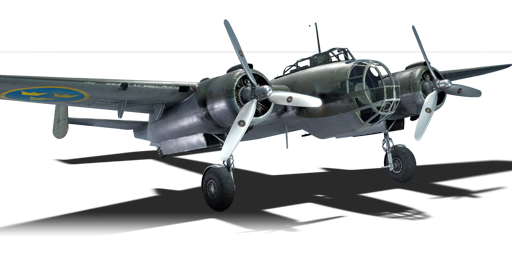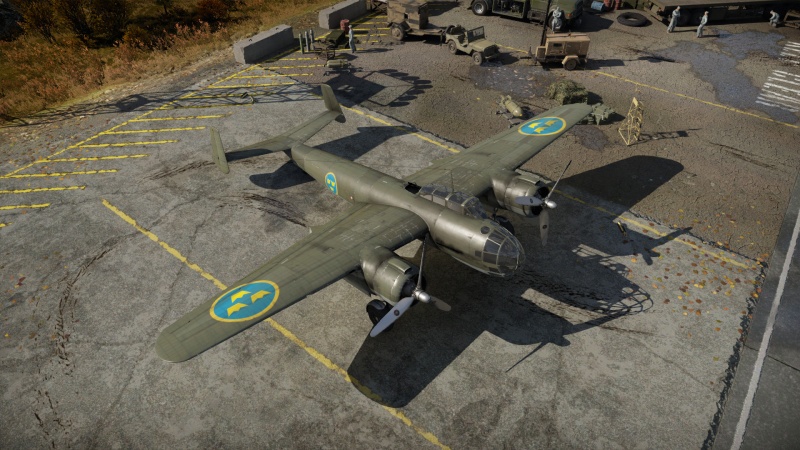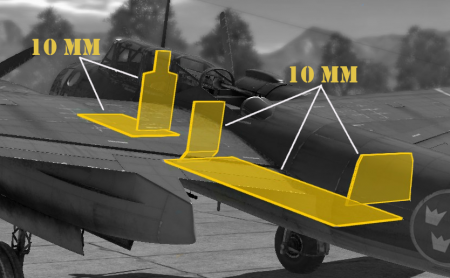Difference between revisions of "B18A"
m (→External links) |
m (→Details) |
||
| Line 67: | Line 67: | ||
! Combat !! Take-off !! Landing !! + !! - | ! Combat !! Take-off !! Landing !! + !! - | ||
|- | |- | ||
| − | | {{Specs|destruction|body}} || {{Specs|destruction|gear}} || | + | | {{Specs|destruction|body}} || {{Specs|destruction|gear}} || 467 || 438 || 290 || ~9 || ~3 |
|- | |- | ||
|} | |} | ||
Revision as of 12:55, 18 February 2021
| This page is about the Swedish bomber B18A. For other versions, see B18 (Family). For the American bomber of similar designation, see B-18A. |
Contents
Description
The B18A is a rank II Swedish bomber with a battle rating of 2.0 (AB), 2.7 (RB), and 2.3 (SB). It was introduced in Update 1.95 "Northern Wind".
Sweden had been using the Ju 86K (export version of the German Ju 86) or the B3C bomber as their main bomber. In 1938 a requirement was put forth to Swedish aircraft manufactures for a fast reconnaissance aircraft with a crew of three. SAAB was awarded the contract for the project and began to build the SAAB 18 alongside the smaller SAAB B17 bomber. At this point the B17 had the facilities priorities in construction, however, the B18 was modified from being just a reconnaissance aircraft to also being a medium bomber. The mid-project changes caused a significant delay in the production of the aircraft which didn’t roll out for duty until mid-1944.
Initially, the B18A aircraft was deemed underpowered with the two Pratt & Whitney R-1830 Twin Wasp radial engines, but would later be replaced by license-built Daimler-Benze DB 605 liquid-cooled engines. Later the B18B variant was modified to operate as a dive bomber/ground attack variant which could be outfitted with three 120 kg bombs or 12 m/51 rockets which could utilize both the internal bomb bay and hardpoints on under the wings. A single defensive positions utilised two 13.2 mm Akan m/39 machine guns which had limited coverage the rear dorsal position of the aircraft. The pilot was in control of a single 13.2 mm m/39A machine gun.
The B18A was a multi-role aircraft which filled a need for the Swedish air forces, which continued on until 1959. This bomber can operate in two roles, either as a medium-altitude bomber working on destroying vehicles and anti-aircraft artillery targets or to bomb enemy bases. Flying at a higher altitude will help to avoid a majority of the fighter aircraft which tend to stay at the lower altitudes. The B18A can also be pressed into service in the lower altitudes and even on the deck. When outfitted with rockets, the B18A can dive-bomb ground targets to include tanks, bunkers, anti-aircraft artillery and naval ships.
General info
Flight performance
| Characteristics | Max Speed (km/h at 4,000 m) |
Max altitude (metres) |
Turn time (seconds) |
Rate of climb (metres/second) |
Take-off run (metres) | |||
|---|---|---|---|---|---|---|---|---|
| AB | RB | AB | RB | AB | RB | |||
| Stock | 445 | 430 | 9100 | 31.2 | 32.2 | 2.1 | 2.1 | 530 |
| Upgraded | 487 | 465 | 28.9 | 30.0 | 8.6 | 5.0 | ||
Details
| Features | ||||
|---|---|---|---|---|
| Combat flaps | Take-off flaps | Landing flaps | Air brakes | Arrestor gear |
| ✓ | ✓ | ✓ | ✓ | X |
| Limits | ||||||
|---|---|---|---|---|---|---|
| Wings (km/h) | Gear (km/h) | Flaps (km/h) | Max Static G | |||
| Combat | Take-off | Landing | + | - | ||
| 735 | 320 | 467 | 438 | 290 | ~9 | ~3 |
| Optimal velocities (km/h) | |||
|---|---|---|---|
| Ailerons | Rudder | Elevators | Radiator |
| < 370 | < 350 | < 400 | > 320 |
Survivability and armour
- 10 mm steel - cockpit floor under pilot's seat
- 10 mm steel - pilot's seatback
- 10 mm steel - rear gunner protective plate
- 10 mm steel - cockpit floor under gunner's seat
- 10 mm steel - aft protective plate
Modifications and economy
Armaments
Offensive armament
The B18A is armed with:
- 1 x 13.2 mm Akan m/39A machine gun, nose-mounted (300 rpg)
Suspended armament
The B18A can be outfitted with the following ordnance:
- 18 x 50 kg sb m/42 bombs (900 kg total)
- 3 x 250 kg mb m/40 bombs (750 kg total)
- 3 x 250 kg mb m/40 bombs + 8 x 50 kg sb m/42 bombs (1,150 kg total)
- 2 x 500 kg mb m/41 bombs (1,000 kg total)
- 2 x 500 kg mb m/41 bombs + 8 x 50 kg sb m/42 bombs (1,400 kg total)
Defensive armament
The B18A is defended by:
- 1 x 13.2 mm Akan m/39 machine gun, dorsal turret (300 rpg)
- 1 x 13.2 mm Akan m/39 machine gun, ventral turret (300 rpg)
Usage in battles
The B18A is a really good aircraft in all game modes. Its frontal armament is really powerful, using HEF shells. It does have a low ammo count of 300 for all guns, including the turrets. The B18A is a good bomber hunter, as you'll be facing He 111s which have such poor defensive armaments. You can easily destroy axis bombers with this plane. The G4M1 and He 111 don't hold a candle to this bomber. You can use this plane in all roles, even fighter.
Bomber: This plane can carry enough bombs to destroy 2 and a half bases on maps with three bases, and 1 base on maps with four respawning bases with its max bomb payload. Once you drop your payload, you can kill any remaining bombers or fighters still hanging around. Remember, if an aircraft is on your six, outspeed them and use your turrets to your advantage.
Ground Attacker/CAS: With 2 x 500 kg + 8 x 50 kg bombs, this plane is a devastating ground attacker. The 500 kg bombs will one shot anything in a huge radius, while the 50 kg ones require more precise drops. It is a great aircraft for ground support. Watch out for SPAAs though, as they will find you a large and easy target.
Fighter/Bomber Hunter: The 13 mm is absolutely devastating. When you prepare for an engagement with a bomber, go head-on, and try to bait them into getting behind you. Use your turrets from below where they have no coverage, and aim for the cockpit. For fighter engagements, you need to ask yourself three things. Am I faster than them? Am I higher than them? Can I dive at least 1.5 kilometers? If the answer to any of them is yes, go for the engagement. Otherwise, run away, and use your good turret coverage and acceleration to speed away and chip with your turrets.
Manual Engine Control
| MEC elements | ||||||
|---|---|---|---|---|---|---|
| Mixer | Pitch | Radiator | Supercharger | Turbocharger | ||
| Oil | Water | Type | ||||
| Controllable | Controllable Not auto controlled |
Controllable Not auto controlled |
Controllable Not auto controlled |
Separate | Not controllable 1 gear |
Not controllable |
Pros and cons
Pros:
- Extremely quick for a twin engine aircraft, especially at altitude - able to cruise at ~560 km/h @ 5 km and even outrun some single-engine fighters
- Blisteringly fast maximum top speed, able to reach over 700 km/h without ripping wings
- Above average climb rate for an aircraft of its size
- Defensive 13.2 mm machine guns have HEF bullets, which will melt any enemies that attack from behind
- Forward-facing 13.2 mm MG is also a very deadly offensive weapon
- Air spawn gives it a good opportunity for chasing down enemy bombers with its superior speed
- Versatile secondary weapons allow it to take on a variety of roles
- Very strong ground attacker, can carry 2 x 500 kg + 8 x 50 kg bombs
- Effective airbrakes
Cons:
- Gunners are vulnerable and die easily
- Higher than average chance of getting set on fire
- Single forward facing 13.2 mm MG is inadequate for taking down larger aircraft like the BV 238
- Very nose heavy when landing, must take great care not to tip forward and crash, leave the airbrake retracted when landing
- As with most DB engined aircraft, the cooling system is vulnerable and you will find yourself overheating after only a few hits
- Low ammo count of 300 rounds per gun for each gun, including the turrets - it is advisable to reload your turrets after an engagement
History
Describe the history of the creation and combat usage of the aircraft in more detail than in the introduction. If the historical reference turns out to be too long, take it to a separate article, taking a link to the article about the vehicle and adding a block "/History" (example: https://wiki.warthunder.com/(Vehicle-name)/History) and add a link to it here using the main template. Be sure to reference text and sources by using <ref></ref>, as well as adding them at the end of the article with <references />. This section may also include the vehicle's dev blog entry (if applicable) and the in-game encyclopedia description (under === In-game description ===, also if applicable).
Media
Excellent additions to the article would be video guides, screenshots from the game, and photos.
See also
Links to the articles on the War Thunder Wiki that you think will be useful for the reader, for example:
- reference to the series of the aircraft;
- links to approximate analogues of other nations and research trees.
External links
| Swedish Aeroplane Company Ltd. (SAAB) | |
|---|---|
| Pre-SAAB: SA / ASJA | |
| SA 'Jaktfalken' | J6B |
| SAAB 17 | B17A · B17B · S17BS |
| SAAB 18 | B18A · B18B · T18B · T18B (57) |
| SAAB 21 | J21A-1 · J21A-2 · A21A-3 · J21RA · A21RB |
| SAAB 29 'Tunnan' | J29A · A29B · J29D · J29F |
| SAAB 32 'Lansen' | J32B · A32A · A32A Röd Adam |
| SAAB 35 'Draken' | J35A · J35D |
| SAAB 37 'Viggen' | JA37C · JA37D · AJ37 · AJS37 |
| SAAB 39 'Gripen' | JAS39A · JAS39C |
| SAAB 105 | SK60B · SAAB-105G |
| License Production | B3C (Ju 86K) |
| Export | SAAB-105OE · J35XS · ▄JAS39C · ◔JAS39EBS HU C |
| Sweden bombers | |
|---|---|
| B3 | B3C |
| B17 | B17A · B17B · S17BS |
| SAAB 18 | B18A · B18B · T18B · T18B (57) |
| T 2 | T 2 |
| Finland | ▄Ar 196 A-5 · ▄Ju 88 A-4 |






